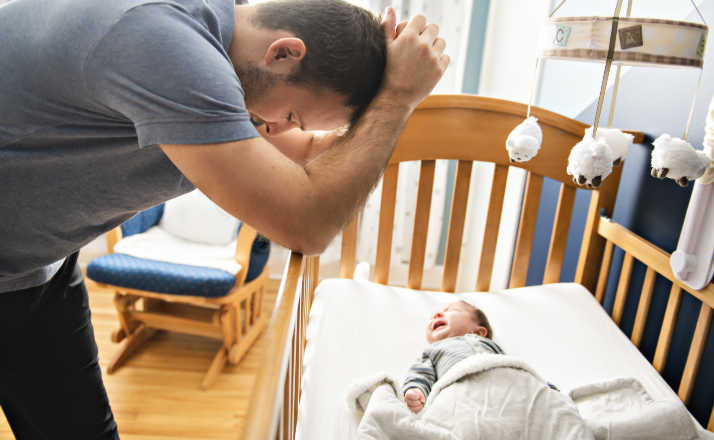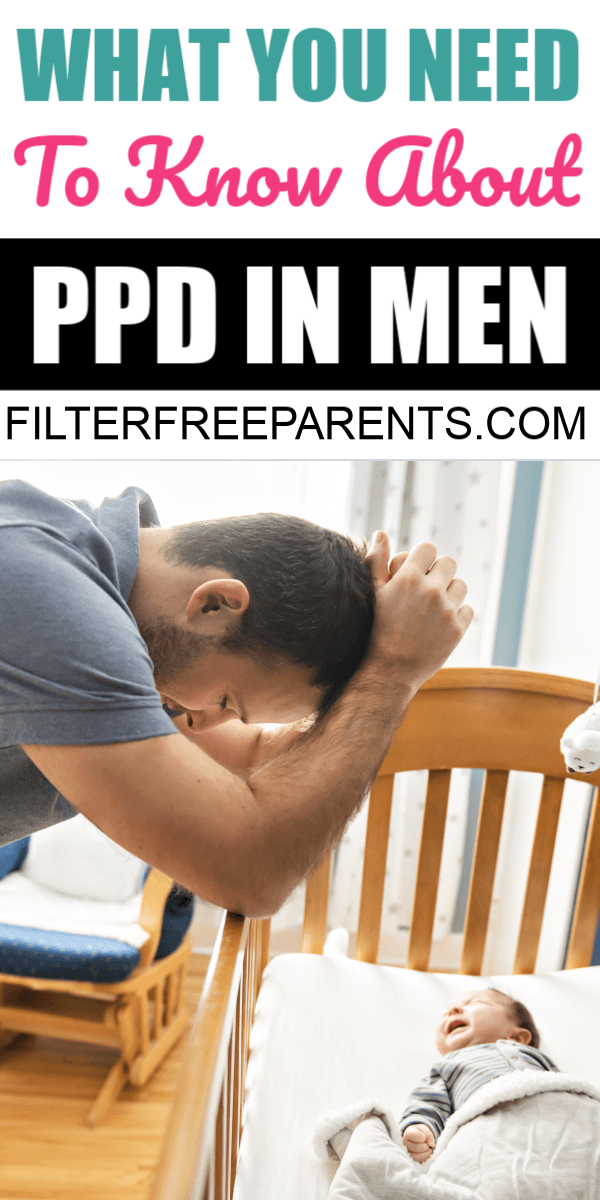I’m a father of three, and with each childbirth, our OBGYN screened my wife for postpartum depression (PPD). And each time, Mel smiled, and nodded, and answered her questions in the most cheerful way possible because frankly, that’s who she is.
No one ever mentioned to me anything about postpartum depression in men.
I remember listening to those questions and being thankful that they were being asked. This was back in the 2000s, when PPD among mothers was just beginning to be discussed, and I’d heard so many horrible stories of depressed mothers going unnoticed and sometimes resulting to tragic decisions.
I wanted our doctor to look at all aspects of my wife, from her body to her mental health, and make sure that she was going to come through healthy and happy.
But I must say, each time I sat in on Mel’s PPD screening, my feet nervously tapped. My palms were sweaty, and I had a pit in my gut.
I was overwhelmed each and every time, but I didn’t feel comfortable expressing those emotions because I didn’t want to be a burden. I didn’t want to distract from Mel and the baby, which was the real reasons were here.
So I just kept repeating a phrase I often do as a man, “suck it up, Clint.”

Now, was I suffering from PPD? Gosh, I don’t know. I honestly don’t.
I know that I have suffered from depression and anxiety most of my life. When it get’s real bad, I end up with full-blown obsessive-compulsive disorder. I’ve seen a therapist off and on for years, and frankly, it seems strange that with my track record of mental illness that no one pulled me, the father, aside, and asked how I was feeling about this life-changing event.
As it turns out, a new UNLV study published in the Journal of Family Issues decided to ask the same question.
It offers an in-depth view of new fathers’ experiences with postpartum depression (PPD).
The study explores issues fathers suffering with PPD encounter and how they can move beyond barriers they face in receiving diagnoses and treatment of the little-known phenomenon.
Now I know, there are people reading this right now, rolling their eyes at the idea of fathers suffering from PPD. And listen, I get that, because honestly, men aren’t the ones pushing a nine pounder out their whoo-ha, then expected to recover, while also trying to get a clingy baby to latch on and feed properly.
But at the same time, let’s take a step back and look at some of the ways PPD in men can come out sideways.
A team of researchers, led by UNLV Couple and Family Therapy professor Brandon Eddy, scoured blogs, websites, forums, and chat rooms for first-hand accounts from new dads.

Here are some of the reactions men suffering from PPD described:
Emotions of confusion, exhaustion, helplessness, loneliness, and feeling trapped. Some men felt resentment towards the baby, became withdrawn, and struggled with outburst of rage.
The last thing that the researchers of this study are suggesting is that we should take any attention away from mom and baby. What they are arguing for, however, is that doctors screen men for PPD when they screen mothers, in hopes of catching it early, while also providing education around male PPD and de-stigmatizing it.
And honestly, that seems reasonable, don’t you think?
Particularly when you consider research elsewhere has found that paternal involvement has many positive outcomes for children, such as boys displaying less hostile behavior then children with absent dads, reduced delinquency for both sexes, considerably higher IQ scores for children in their early development years, and lower levels of emotional distress.
That’s on top of studies showing fathers who suffer from PPD report lower levels of communication with their partners, as well as increased rates of substance abuse and domestic violence.
And to be honest, as a father, I’d have loved for someone in this whole process to simply pull me aside and ask how I was doing, particularly with my first child, because I had no idea what to expect, or how I was supposed to feel.
I mean, I know a lot of people told me about the wonders of fatherhood, but the reality of it was actually a bunch of sleepless nights, where I struggled to keep up with classes (I was still in college) while waiting tables, and wondering if my marriage was going to survive.
I was a huge ball of stress from the moment Mel became pregnant until, well, now…
I don’t know how I would’ve responded to someone asking me how I was doing after a having our first child. I probably would’ve tried to pull the man card and say I was fine. But at the same time, it would have been helpful to receive a list of resources so that when I wasn’t fine, which definitely happened, I’d have known where to go and what to do.
The authors of this study came to a similar conclusion,
“The expectations society gives to men of what they are supposed to be, what they are supposed to do, and how they do it was a significant factor on how many of these men chose to cope with life stressors. Because men are already less likely than women to seek professional help for depression, it is vital that the stigma of PPD decrease… Because paternal involvement is a significant factor in the healthy development of children, it would seem wise to make information about paternal PPD more available in order to combat its negative impact on families.”
As a father, I cannot help but advocate for PPD screening for men. It seems like a simple and equal way to help fathers be better fathers. And honestly, new fathers, much like new mothers, need all the help they can get.











